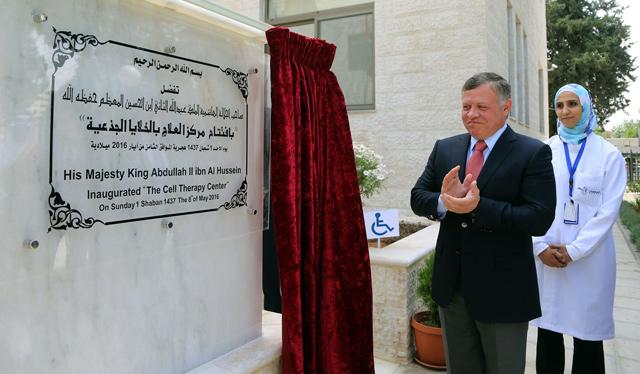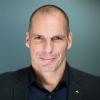You are here
King’s support, strong foundation help cement Jordan’s ‘reputable status’ in medical tourism
By Maram Kayed - Jun 08,2019 - Last updated at Jun 08,2019

His Majesty King Abdullah inaugurates a cell therapy centre at the University of Jordan in May 2016. The centre was part of efforts to boost research and medical tourism in the Kingdom (Photo courtesy of the Royal Court)
AMMAN — “Under the direction of His Majesty King Abdullah, the sector of medical tourism has seen exceptional support, support which has thus fostered growth,” said Mohammed Samih, president of the Jordan Society of Tourism and Travel Agents.
Samih, in his own words, has been “heading a sector which has benefited greatly” from King Abdullah’s attention and direction to the government.
He added: “Jordan has a solid base, which is its medical sector, to build on. His Majesty, however, is the one who places the spotlight on it.”
In 1985, at the King Hussein Medical Centre, Daoud Hanania performed the first successful cardiac transplant in the Middle East. Twelve years earlier, in 1973, he also performed the first kidney transplant in the Arab world.
Hanania said in a 2016 interview with Al Rai that he believed that the King Hussein Medical Centre was “the best health service provider in the Middle East”.
The World Bank backed the doctor’s statement in a 2007 report listing Jordan as “the best healthcare service provider in the Middle East and north Africa”.
More recent reports by the World Bank rank Jordan as the number one medical tourism provider in the Arab region and among the top five in the world.
In 2009, Medical Tourism Magazine called the country “a rising medical hub from the Middle East”, and in 2014, Jordan won the “Medical Destination of the Year” award from the International Medical Tourism Journal.
With its mix of public and private hospitals, the Kingdom “continues to uphold its reputable status in the medical sector”, the Ministry of Health’s spokesperson, Hatem Azraai, said.
Azraai added that the Kingdom possesses “competitive advantages”, in medical tourism.
“Jordan’s high-quality services, paired with competitive low costs, political stability and numerous sightseeing spots are what make it a top destination for medical tourists,” he noted.
Heart valve replacement surgery costs approximately $170,000 in the US, while the same procedure costs $14,400 in Jordan, according to the International Medical Tourism Association. USAID also ranked the Kingdom among the top three cheapest countries in the world for 63 per cent of their selected medical procedures.
“Compared with the region and the world, the costs are relatively low for A-class medical services,” Azraai said.
On average, Jordan receives more than 200,000 medical tourists a year, according to Fawzi Hammouri, chairman of the Private Hospitals Association.
Hammouri noted that the most in-demand treatments from foreign patients include those for heart diseases, bone and spine surgeries, cancers and tumours, dental procedures, eye and ear infections and sterility.
“There is also, of course, the Dead Sea, the most desired skin-disease treatment in the world,” he added.
Existing, certified and awarded institutes
The World Bank ranks the King Hussein Cancer Centre as the sixth best cancer treatment centre in the world. And according to Medical Tourism Magazine, it is the only cancer centre outside the United States to be awarded the Joint Commission International Clinical Care Programme Certificate for its oncology programme.
It is also the first oncology hospital outside of the US to hold MAGNET accreditation — an accreditation only held by 8 per cent of hospitals in the US and nine international healthcare institutions.
Most recently, in January 2019, the centre won the “Best Medical Centre in the Middle East” award given by Hamdan Medical Awards.
As for the Royal Medical Services (RMS), which has 11 hospitals under its wing and deals with conflict-related care, the organisation has partnered with governments and non-profit organisations in Palestine, Libya, Yemen and Sudan to train doctors and treat patients.
“The RMS is military-run, and our military’s name is literally the ‘Arab Army’. It has that engraved on their uniforms. We must extend our help to all [of] the Arab world, or otherwise we would not live up to our name,” a doctor, who preferred to remain anonymous, told The Jordan Times.
“It is, of course, His Majesty’s orders and direction that Jordanians must do their duties for their fellow Arabs,” added Samih.
Unlocking the sector’s potential
Despite progress made in the last 20 years, there are still new doors for the sector to open, according to Azraai, who listed the Medical Liability Law, passed last year, as one such door.
With the direction and then approval from His Majesty King Abdullah, the new law refers cases of medical malpractice or errors to a specialised jury before they are presented in front of a judge.
Article 6 of the law states that doctors have to explicitly register patients’ conditions and medical history, and inform them of their condition and the level of danger involved in any treatment.
Article 7 bans healthcare providers from carrying out any act related to patient treatment without their consent, except in cases that require emergency intervention and when such approvals are impossible to obtain.
The article also prohibits medics from refusing to treat patients, using unlicensed medicine or equipment or prescribing medicine before clinical examination.
Azraai said the law and its “holistic approach” aims to provide prospective medical tourists with the assurance they need before coming to the Kingdom for treatment.
His Majesty King Abdullah, in previous remarks on the bill, said that its enactment would be a “major step” in efforts to encourage medical tourism.
In Jordan’s private sector, Baby Cord, the first cryopreservation facility for stem cells and tissue in Jordan, recently upgraded their services to include certified storage facilities in 2015.
According to CEO Maisa Shaheen, Baby Cord used to only offer freezing services. The frozen samples were then transferred to the US.
However, the storage facilities now offer patients the option to store blood for 30 years at a cost of JD2,800.
“That is only JD90 a year. We pay more for phone credit,” Shaheen said.
She noted that the facility is also equipped for any advancement that might arise in the next 10 years. “We expect an increased demand from both Jordan and the region, and we have equipped ourselves well for that.”
Related Articles
AMMAN — The decision to grant medical tourists who possess “certain unrestricted nationalities” a two-month residency instead of one was met
AMMAN — Sheikh Hamdan Bin Rashid Al Maktoum, deputy ruler of Dubai, has recently honoured the King Hussein Cancer Centre (KHCC) with the She
AMMAN — HRH Princess Ghida Talal, Chairperson of the King Hussein Cancer Foundation (KHCF) and Centre (KHCC), has launched the King Hussein













